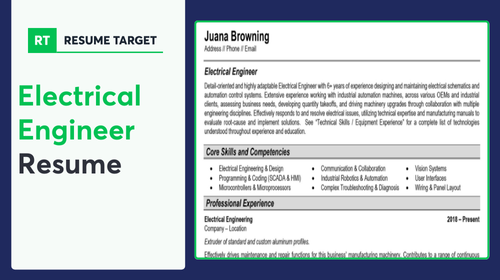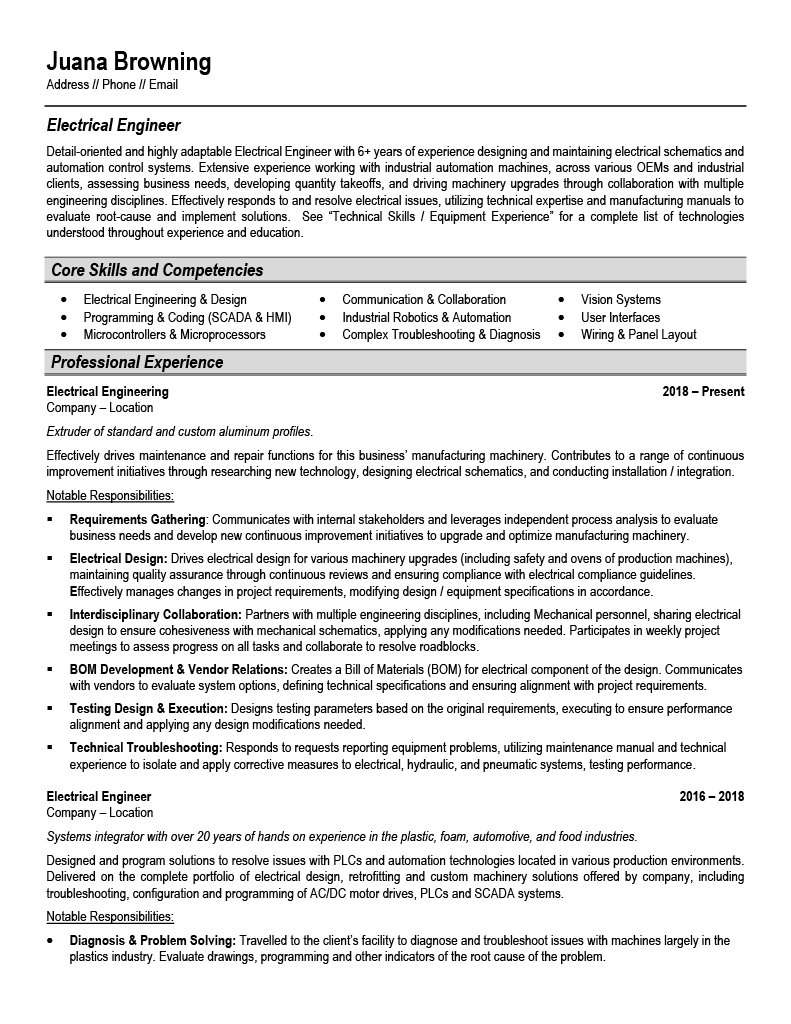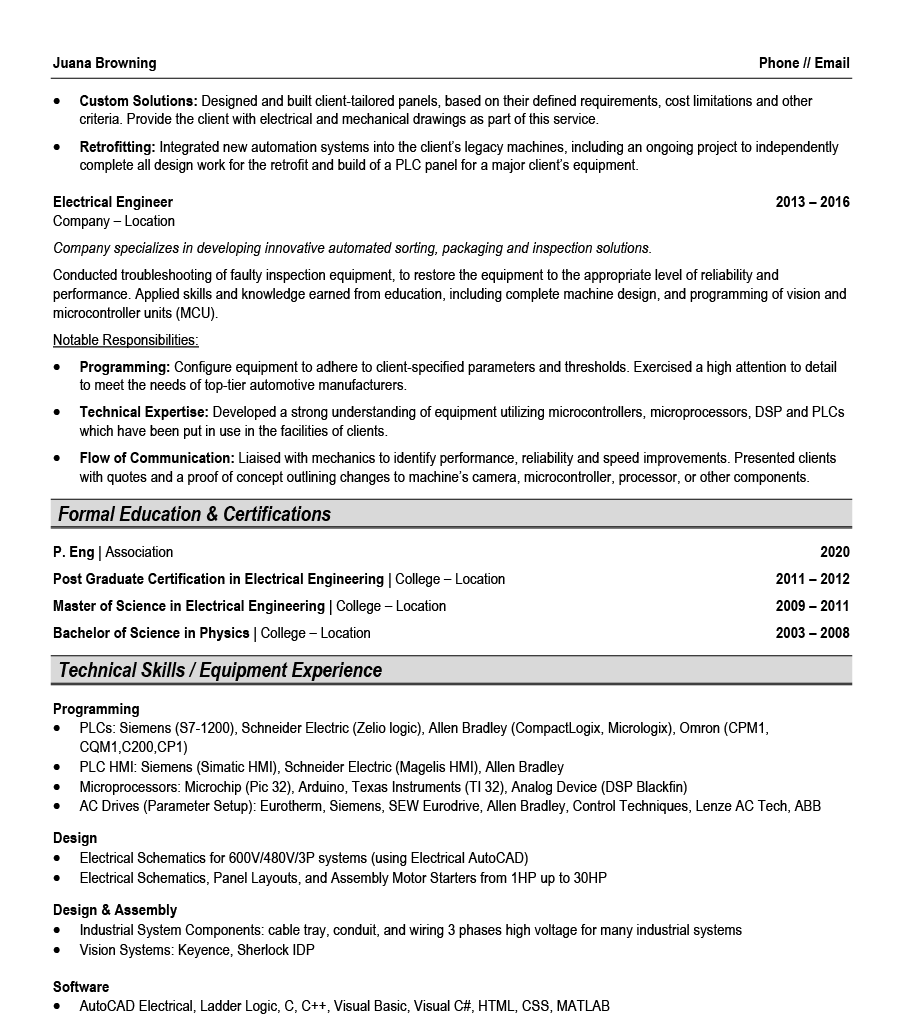

Circuit diagrams may be second nature, but crafting a powerful resume leaves many electrical engineers short-circuited. Technical expertise alone won't make your application stand out in today's competitive market.
Are you struggling to translate complex engineering achievements into clear, compelling resume content? Your resume needs to bridge the gap between technical mastery and real business impact to catch a hiring manager's attention.
Resume Target specializes in helping electrical engineers showcase both technical prowess and measurable results. This guide will show you exactly how to transform your engineering experience into a resume that generates interviews and job offers.


From the smartphone in your pocket to the power generation equipment keeping your lights on, electrical engineers are the innovative minds behind the technology that powers our modern world.
These technical professionals combine their expertise in mathematics, physics, and electronics to design and develop sophisticated electrical systems, working methodically through complex challenges to create everything from medical devices to renewable energy solutions.
If you're fascinated by both the theoretical and practical aspects of electrical science, you'll find that a career in electrical engineering offers diverse opportunities for growth, whether you specialize in power systems, telecommunications, or the cutting-edge field of microelectronics.
Let's talk about what's exciting in the electrical engineering field - your earning potential is impressive! From entry-level positions to executive roles, this career path offers substantial compensation that reflects your technical expertise and problem-solving abilities. And guess what? Electronics specialists tend to earn even more than their electrical engineering counterparts.
Figures from: U.S. Bureau of Labor Statistics
Electrical Engineers can advance from entry-level positions to senior leadership roles, with median salaries exceeding $100,000. Your career path can span various industries, from power generation to aerospace, offering diverse growth opportunities.
To accelerate your career growth, you'll need to master both technical expertise and leadership capabilities that go beyond basic engineering skills.
- Advanced Circuit Design and Analysis - Power Systems and Control Engineering - Project Management and System Architecture - Leadership and Cross-functional CommunicationLaunch your electrical engineering career by earning a bachelor's degree in electrical engineering from an ABET-accredited program, which combines hands-on laboratory work with theoretical studies to prepare you for real-world challenges.
To advance in electrical engineering, you'll need to develop strong math skills and problem-solving abilities while gaining practical experience through internships, co-op programs, or entry-level positions.
Requirements from Study for FE
From California's tech corridor to Michigan's automotive hub, electrical engineering jobs span diverse sectors and regions.
Figures from U.S. Bureau of Labor Statistics
Struggling to translate your circuit designs, power systems expertise, and technical projects into a compelling electrical engineering resume that stands out from other candidates? This comprehensive, section-by-section guide will walk you through exactly how to showcase your engineering achievements, technical skills, and project experience in a way that catches hiring managers' attention.
As an electrical engineer, you might find it challenging to condense years of complex technical expertise into a few compelling lines at the top of your resume.
While you excel at designing circuits and solving intricate power distribution challenges, translating your technical prowess into words that resonate with hiring managers requires a different kind of engineering altogether - one that showcases both your technical capabilities and your business impact.
How would you describe your engineering specialization and the scale of electrical systems you typically work with (from microelectronics to power distribution systems)?
Reason: This helps establish your specific niche within the broad field of electrical engineering and immediately signals to employers your scope of expertise and technical comfort zone.
What combination of technical expertise and soft skills best defines your approach to electrical engineering projects and team collaboration?
Reason: Engineering roles require a balance of technical knowledge and interpersonal abilities - highlighting this combination upfront helps paint a complete picture of your professional value.
How do you typically integrate emerging technologies and industry standards into your electrical engineering work while maintaining system reliability?
Reason: This demonstrates your ability to balance innovation with practical implementation, showing potential employers you can modernize systems while maintaining operational stability.
As an electrical engineer, you'll need to showcase both your technical expertise in circuit design and power systems alongside your practical abilities with testing equipment and industry software.
Your resume should highlight specialized skills like AutoCAD and MATLAB proficiency, while also emphasizing crucial soft skills such as problem-solving and cross-functional team collaboration that employers value in modern electrical engineering roles.
Showcase your technical expertise and project achievements by organizing your electrical engineering experience into three powerful sections: a concise role overview that sets the stage, quantifiable achievements that highlight your impact on systems and efficiency, and core responsibilities that demonstrate your technical mastery.
Many Electrical Engineers struggle to translate their technical expertise and complex project work into clear, compelling achievements that resonate with hiring managers. Transform your technical accomplishments into powerful success stories by connecting your engineering solutions directly to measurable improvements in efficiency, cost savings, and system reliability.
The responsibilities section demonstrates how Electrical Engineers solve complex technical challenges and drive innovation in system design. Your duties should showcase both technical expertise and the ability to translate engineering concepts into business value while highlighting your role in project success.
Your educational background and professional certifications are crucial proof points of your technical expertise in electrical engineering. Lead with your highest degree and most relevant certifications, especially those focused on power systems, circuit design, or specialized areas like control systems that align with your target role.
Now that you've built a strong foundation using Resume Target's proven resume writing guidelines, you're ready to transform your resume into a powerful tool for electrical engineering positions.
While many candidates stop at customizing their cover letter, successful electrical engineers know that personalizing their resume for each specific role is what sets them apart in this competitive technical field.
By strategically incorporating keywords and technical requirements from each job posting, your customized resume will not only sail through ATS screening systems but will also demonstrate to hiring managers that your electrical engineering expertise perfectly aligns with their needs.
Ready to supercharge your job search? Let's turn your electrical engineering resume into your secret weapon for landing interviews at top companies!
Don't let a lack of work experience stop you from launching your career as an Electrical Engineer!
Your technical education, hands-on lab work, and engineering projects can showcase your potential more effectively than unrelated work history.
Focus on highlighting your engineering coursework, technical skills, and any internships or academic projects that demonstrate circuit design, programming, or systems analysis abilities.
For more detailed guidance, check out the Student Resume Writing Guide to create a resume that powers up your job search.
Your resume summary is your chance to showcase the valuable technical skills and project experience you've gained through your engineering coursework and hands-on projects.
Focus on highlighting your academic achievements, internship experiences, and the specific electrical engineering competencies that make you stand out as an emerging professional.
"Detail-oriented and technically skilled Electrical Engineer with foundational experience in circuit design, power systems, and control systems through academic projects and internships. Proficient in AutoCAD, MATLAB, and PLC programming with hands-on experience in laboratory testing and prototype development. Demonstrated leadership abilities through successful completion of senior design project in renewable energy systems. Seeking to leverage strong academic foundation and technical skills to contribute innovative solutions as an Electrical Engineer."
Now's your chance to transform your electrical engineering coursework and hands-on lab experiences into compelling proof of your technical expertise!
Don't just list your degree - highlight relevant courses like Circuit Design and Power Systems, plus showcase impactful projects like your senior capstone where you designed and built working prototypes.
Courses common to a degree/certification for Electrical EngineersRelevant Coursework: Circuit Analysis | Digital Systems Design | Power Electronics | Electromagnetic Theory | Control Systems | Signal Processing
Key Projects:
Smart Home Energy Management System: Developed and implemented an automated system to optimize residential power consumption and reduce energy costs by 25% through real-time monitoring and control.
Renewable Energy Integration Project: Collaborated with a four-person team to design a hybrid solar-wind power system for a small commercial building.
Leverage your academic training, internship experiences, and technical certifications by showcasing the electrical engineering skills you've developed through coursework, laboratory projects, and hands-on learning opportunities.
As an entry-level Electrical Engineer, highlighting these foundational skills demonstrates your readiness to contribute to engineering teams, with excellent growth potential in this dynamic and expanding field.
Let's face it - translating your complex circuit designs, technical specifications, and innovative solutions into clear, compelling resume content can feel like trying to explain quantum physics to a fifth grader.
At Resume Target, we specialize in engineering resumes and know exactly how to showcase your technical expertise in ways hiring managers understand and value.
Our proven track record includes helping countless electrical engineers land roles at top firms by highlighting their achievements in power systems, control design, and project leadership.
With major infrastructure and tech projects ramping up across the industry, now is the perfect time to transform your technical expertise into a powerful career marketing tool - let's get started with a free consultation today.
Impress any hiring manager with our Engineering resume writing service. We work with all career levels and types of Engineering professionals.
Learn More → Engineering Resume Writing Services